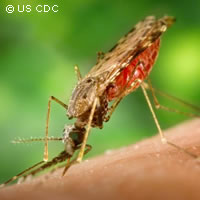EU researchers to develop malaria vaccine
A network of European researchers has been awarded EUR 2.4 million by the EU to take forward research into a malaria vaccine. Currently there is no licensed vaccine for the disease, although there are a number of potential vaccines at various stages of development. The project is called 'Preclinical Studies towards an affordable, safe and efficacious two component paediatric malaria vaccine'. Coordinated by Dutch biotechnology company Crucell, the project will run for three years. The project partners plan to carry out pre-clinical trials of a vaccine in which a version of the BCG (tuberculosis) vaccine is used as a vector for the malaria antigen. The BCG is already given to children at birth as part of the vaccination schedule in Africa, so combining the two makes a lot of sense, say the researchers. During the project, the partners will carry out studies on animals to investigate how well the vaccine works and determine the best dose. Crucell is also working on another approach to the malaria vaccine problem, which involves inserting parts of the malaria parasite into a virus that carries the vaccine into the body. This approach, which has been developed in partnership with the US' National Institutes of Health, is at a much later stage of development, having reached the clinical trials stage. Malaria is caused by a parasite called Plasmodium, which is transmitted to humans by Anopheles mosquitoes. Symptoms include fever, headache and vomiting. According to figures from the World Health Organisation, malaria causes more than 300 million acute illnesses and at least one million deaths every year. Most of these deaths are young children living in sub-Saharan Africa. Over the years the malaria parasite has increasingly developed resistance to drugs developed to combat it, while the Anopheles mosquito has become resistant to many insecticides, making the search for a vaccine to prevent the disease ever more important.



